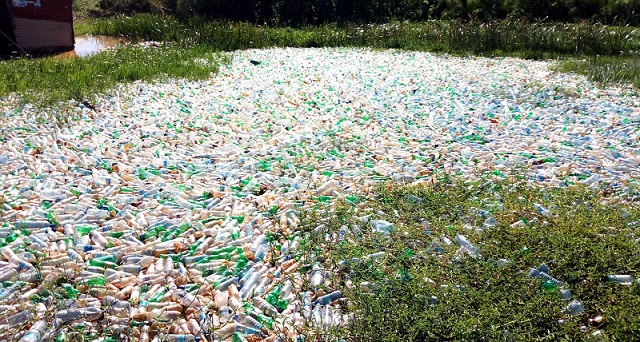
COMMENT | REGINA ASINDE | Today, June 5, 2025, the world will come together to mark World Environment Day under the critical theme “End Plastic Pollution.” This year’s call is not just to observe but to act boldly, urgently, and together. The plastic crisis is no longer an invisible threat—it is choking our rivers, poisoning our soil, filling our air with toxins, and infiltrating even the food we eat.
This week, I had the privilege of joining a radio talk show to discuss this issue. When we opened the phone lines, the response was overwhelming. Caller after caller asked one vital question: “How can we tackle this plastic pollution that is eating up our planet?”
This question captured the deep concern and readiness of ordinary citizens to be part of the solution.
The truth is, the fight against plastic pollution must not only be top-down. While we call on our government to enforce a ban on single-use plastics, implement Extended Producer Responsibility (EPR), and harmonize environmental laws, these steps will not succeed without local participation.
If we, the people, stop demanding plastic, the industry will have no reason to produce it. If we walk into markets with our own baskets and cloth bags and politely refuse plastic, vendors will adapt. If vendors stop offering plastic, manufacturers will stop producing it. The most powerful resistance to plastic is not just legal—it is cultural and behavioral.
And we don’t have to invent new ways to live sustainably—we already had them. Indigenous knowledge provides time-tested alternatives. Our grandparents wrapped food in banana leaves, drank from gourds, stored water in clay pots, and carried goods in woven baskets. These materials were biodegradable, safe, and beautifully in harmony with nature.
Reclaiming these practices is not a step backward—it’s a leap forward. Imagine:
- Water packaged in earthen or bamboo containers.
- Food wrapped in banana leaves or tied in cotton cloth.
- Market baskets woven from papyrus or palm fiber.
This not only reduces plastic consumption but also stimulates local economies, protects wetlands, revives traditional crafts, and restores biodiversity. It creates meaningful work, especially for women and youth in rural communities.
This World Environment Day, we must recognize that real change starts not in boardrooms, but in homes and markets. Schools must teach children to value nature-friendly habits. Communities must celebrate indigenous practices. Faith and cultural leaders must champion this message.
So, to all those who called into the radio show this week and asked what we can do—here is the answer: We can choose better every day. We can say no to plastic. We can say yes to the wisdom of our ancestors. Because if we stop demanding plastic, the system will stop producing it.
Let us act—today, together, and from the ground up—to end plastic pollution. The future of our planet depends on it.
****
 The author is the Country Director of LERWA–Land and Environmental Rights Watch Africa Ltd, an author, and a community organiser with experience in human rights advocacy. She works at the intersection of land, environment, and social justice, supporting grassroots communities to amplify their voices and protect their rights. Her writing and organizing are deeply rooted in cultural awareness and a commitment to equity. Email: skasede@gmail.com
The author is the Country Director of LERWA–Land and Environmental Rights Watch Africa Ltd, an author, and a community organiser with experience in human rights advocacy. She works at the intersection of land, environment, and social justice, supporting grassroots communities to amplify their voices and protect their rights. Her writing and organizing are deeply rooted in cultural awareness and a commitment to equity. Email: skasede@gmail.com
 The Independent Uganda: You get the Truth we Pay the Price
The Independent Uganda: You get the Truth we Pay the Price





